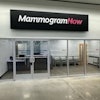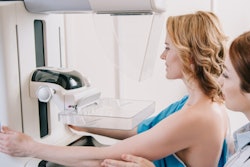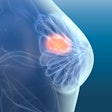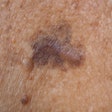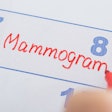
Food security status impacts women's adherence to breast imaging guidelines, a report published January 25 in Cancer Causes Control found.
Researchers led by Asos Mahmood, PhD, from the University of Tennessee found that women facing food insecurity have over 50% lower odds of reporting breast cancer screening in the past two years compared to food-secure women.
"Our findings suggest that women facing food insecurity encounter structural, multilayered, and multifactorial barriers to breast cancer screening," Mahmood et al wrote.
Previous studies suggest that socioeconomic barriers prevent women from receiving timely breast cancer screening, as well as being aware of what such preventive services can do for their health. The researchers noted that "less emphasis" has been placed on food insecurity when it comes to studying social determinants of health. They wrote that this is related to economic instability, a key health determinant.
Mahmood and colleagues wanted to explore the impact of food insecurity on biennial breast cancer screenings among older U.S. women. They included 2,681 women between the ages of 50 and 74 years in their study. Data was extracted from the 2014 and 2016 waves of the Health and Retirement Study, as well as the 2013 Health Care and Nutrition Study.
The team found that food insecurity had significant ties to failure in obtaining a mammogram or breast x-ray within the past two years. Women deemed to be food insecure had 54% lower odds of reporting breast cancer screening within that time, with an adjusted odds ratio of 0.46, compared with food-secure women (p < 0.001).
Factors significantly linked to a higher likelihood of receiving breast cancer screenings included obtaining higher education, having higher household income, having regular access to health care and advice, not smoking, and not being physically disabled or experiencing depressive symptoms.
The study authors wrote that their results suggest that efforts to address social determinants of health must also include promoting breast screening behaviors among women facing food insecurity. This especially goes for older women and women at increased risk for breast cancer, they added.
The team suggested that healthcare practices implement a patient navigation model or expand partnerships with food banks. It added that healthcare providers and physicians can help in this area by screening patients for food insecurity or other social risks, as well as following up with them on cancer screening recommendations.
They also suggested that providers communicate that health insurance could allow for free access to screening services regardless of other barriers. For example, under the Affordable Care Act, women's preventive healthcare services must be covered with no cost-sharing to consumers.
Also, private health insurance plans and the State Medicaid expansion programs must cover mammography at least biennially and as frequently as once a year for women ages 40-74 who are at average risk of breast cancer, without consumer cost-sharing, according to the authors.
